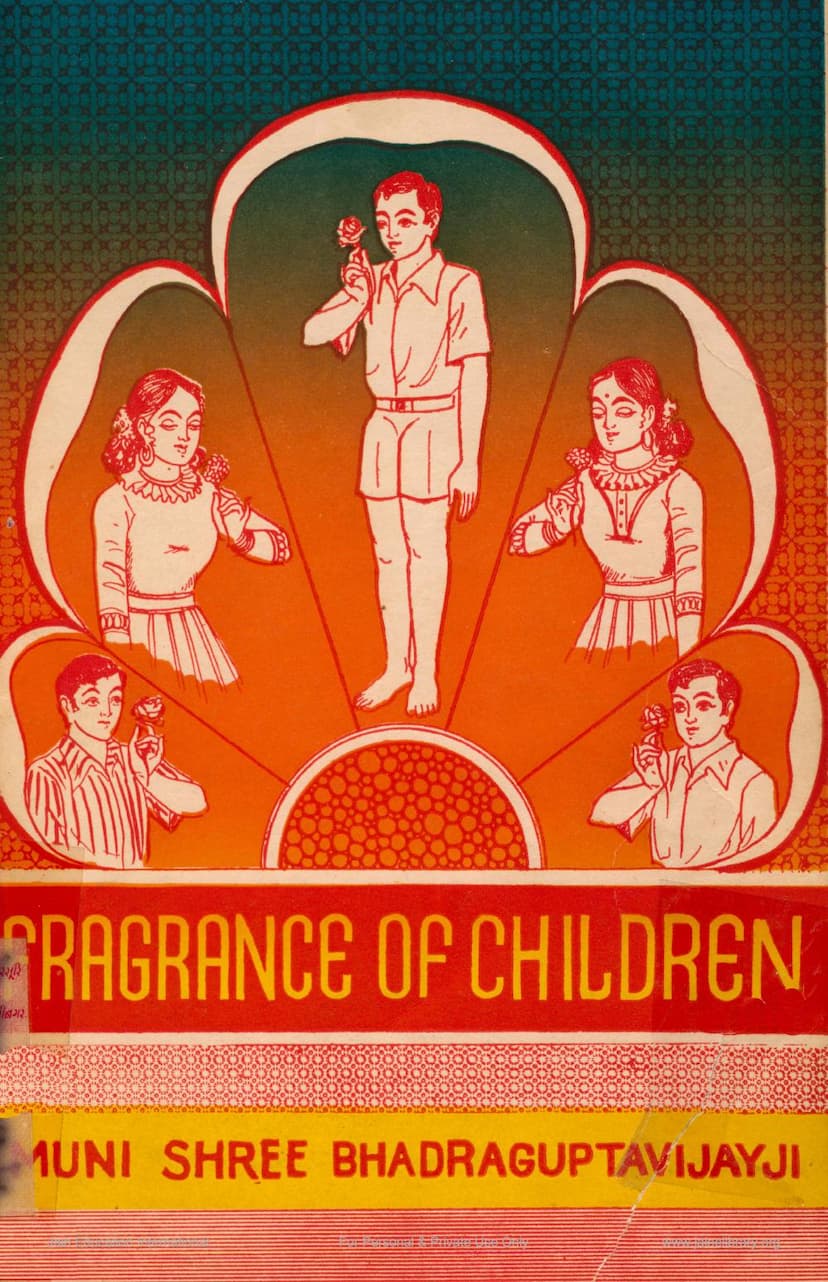Fragrance Of Children
Added to library: September 1, 2025

Summary
Here's a comprehensive summary of the Jain text "Fragrance of Children" by Munishree Bhadraguptavijayji:
Book Title: Fragrance of Children Author: Munishree Bhadraguptavijayji Publisher: Shree Vishvakalyan Prakashan Trust, Mehsana (Gujarat) First Edition: November 1976
Overall Purpose:
"Fragrance of Children" is a booklet designed for children, aiming to instill moral, religious, and spiritual values. The author expresses a heartfelt desire for these booklets (including "Life of Children" and "Thinking of Children") to be accessible in multiple languages, promoting the holistic development of every child. The book emphasizes that a successful life hinges on this threefold development and encourages parents, tutors, and preceptors to actively guide children in this direction. It also urges children to embrace these booklets as close companions and guides.
Key Themes and Content Breakdown:
The booklet is structured into 13 short chapters, each focusing on a specific aspect of righteous living and spiritual awareness for children:
-
Homage: Teaches children the importance of paying respect and showing love towards God, their Preceptor (Guru), their father, and their mother, recognizing and remembering their obligations.
-
In the Morning: Emphasizes starting the day with remembrance of the Shree Navkar Mantra, a fundamental Jain prayer. It explains the significance of the five supreme beings (Arihantas, Siddhas, Acharyas, Upadhyayas, and Sadhus) mentioned in the mantra and the benefits of meditating on it, such as the eradication of suffering and sins, and the sowing of seeds of merit and happiness.
-
Do and Don't: Outlines fundamental ethical guidelines. Children are instructed to avoid harming living beings, lying, and stealing. They are encouraged to show mercy, be benevolent, perform virtuous deeds, and avoid abusive language. The chapter also highlights the importance of providing food, water, and clothing to those in need.
-
Take Out: Focuses on eliminating negative qualities. Children are advised to daily "take out" anger, pride, deceit, and greed. The text explains how to overcome these vices: anger with forgiveness, pride with modesty, deceit with straightforwardness, and greed with donation. It also illustrates the consequences of these negative emotions and the benefits of their positive counterparts.
-
Tolerate: Stresses the virtue of tolerance. Children are encouraged to tolerate rebukes from parents, punishments from teachers, abuses from others, and general unhappiness. It advises against opposition and retaliation. The chapter highlights that tolerance leads to the accumulation of merits, earning affection from all, becoming learned and great, and gaining a good reputation.
-
Never Eat: Lists specific foods that are discouraged in Jainism, such as potatoes, onions, brinjals, ginger, radishes, sweet potatoes, carrots, honey, and eggs. The reasoning provided is that these foods can spoil the mind, lead to sinful thoughts and actions, and result in negative consequences. The text prioritizes remaining hungry over consuming these items.
-
Never Kill: Addresses the principle of ahimsa (non-violence) towards even the smallest creatures. Children are asked to consider the guiltlessness of insects like flies and mosquitoes and to question their own right to take their lives. It draws a parallel to how humans would feel if unjustly harmed, emphasizing that killing insects is also an injustice.
-
How Will You Live?: Presents a choice between two paths: living by harming others versus living by reviving them; living by quarreling versus living in peace; living by selfishness versus living by benevolence; living by committing sins versus living by performing religion. The booklet strongly advocates for the latter, more virtuous path, stating that living by performing religion is superior, even to death.
-
Never See: Warns against engaging in activities that corrupt the mind and senses. Children are advised to avoid cinemas and dramas, seeing the faults of others, seeing the vices of others, and seeing the wealth of others. The consequences mentioned include spoiled eyesight, wasted money, diseased minds, ruined lives, the adoption of faults and vices, and the arising of bad intentions and greed. It encourages opening the "inward eye."
-
Do Learn: Emphasizes the importance of acquiring knowledge, particularly spiritual and ethical knowledge. Children are encouraged to learn about practicing non-violence, speaking truth, performing benevolence, understanding the Soul, merits, sins, the channels of karma, the emancipation of the soul, and the prosperity of the soul. It asserts that knowledge leads to modesty, forgiveness, frankness, politeness, and dispels ignorance.
-
Don't Be Jealous: Advises against jealousy of others' possessions, happiness, or power. It describes jealousy as a source of trouble, misery, envy, and mental turmoil. Instead of being jealous, children are encouraged to reflect on the reasons for others' success (past virtuous deeds) and to focus their efforts on practicing religion themselves to attain happiness and overcome miseries.
-
Think Day-to-Day: Inspires children by encouraging them to aspire to the noble qualities and deeds of great Jain figures like Bhagwan Mahavir, Shalibhadra, Dhana Anagar, Emperor Samprati, Kumarpala, Punia, and Hemchandracharya. It suggests that by emulating these personalities and performing great deeds, they too can grow to be great and ultimately strive for the emancipation of the soul and the prosperity of the universe.
-
Bhagwan Mahavir: Provides a brief biographical account of Bhagwan Mahavir, highlighting his birth in Kshatriya Kund, his parents King Siddhartha and Queen Trishala, his name Vardhaman Kumar, his impartiality, fearlessness, modesty towards his parents, marriage to Yashoda, and eventual renunciation. It describes his attainment of pure knowledge and liberation from all illusions and passions, culminating in his status as a Supreme God. The chapter concludes with salutations to Bhagwan Mahavir.
Structure and Tone:
The booklet uses simple language and a gentle, encouraging tone suitable for children. Each chapter is concise and often uses a question-and-answer format or lists of actions. The latter part of the book includes a comprehensive set of questions related to the content of each chapter, serving as a review or learning assessment.
In essence, "Fragrance of Children" is a foundational guide for young Jains, providing practical advice and spiritual inspiration rooted in Jain principles to cultivate a virtuous and meaningful life.